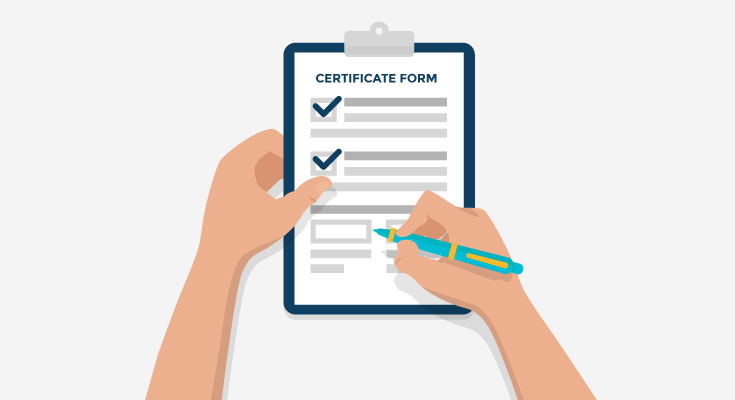Almost every business is asked to provide a good standing verification certificate. Only the state can issue the good standing certificate verification. It’s one document that every business should be able to provide when asked for it.
Every business, LLC, or any other entity needs to have a good standing status in its records. This helps banks, financial institutions, and other businesses understand that the business is in good standing. A good standing verification certification can help in:
- Maintain the limited liability that an entity provides.
- Take their business into other states.
- Acquire a loan on the basis of good standing.
- Get rid of state-imposed fines and penalties.
Most of the time, a lender requires a good standing verification certification to offer a loan. Businesses can avoid delays in the loan approval process by maintaining good standing.
What is a Good Standing Certificate?
A certificate of good standing lets others know that the company is legally registered with the state and it complies with all the state laws, such as:
- State registration fees
- Required document filings
- Legally permitted to conduct business in the state
A certificate of good standing usually contains an expiration date. This date suggests when the organizational registration is due. This renewal date could be at the end of a calendar year, or during some other time when the state’s laws require renewal or periodic filings.
This rule is similar for businesses formed somewhere else and registered as foreign entities in the state.
Most users confuse good standing as a business or occupational license, but it’s not. A company can also do business in the state it was formed, it does not need a good standing certificate to do so.
Which Businesses can Get a Good Standing Certificate?
As not all businesses need to register themselves with the state, they won’t be able to obtain a good standing certificate. Lenders, government agencies, and even other businesses can ask for a good standing certificate of a business.
If you want to get a good standing certificate, then there are two ways you can follow. The easiest ways are to register or qualify their company to transact business in another state and to open a business banking account. A good standing certificate acts as part of the compliance.
How to Obtain a Good Standing Certificate?
As mentioned above, the best way to get a good standing certificate is to register your business with a state. When you register your business, the state will offer a certificate of good standing.
The issuing entity is often the secretary of state or any one of their subdivisions. The agency has different names based on the state they are in:
- Arizona: Arizona Corporation Commission
- Massachusetts: Corporations Division, Secretary of the Commonwealth of Massachusetts
- Michigan: Corporations Division, Department of Licensing and Regulatory Affairs
- New Jersey: Division of Revenue and Enterprise Services, Department of the Treasury
- Utah: Division of Corporations and Commercial Code, Utah Department of Commerce
- Virginia: State Corporation Commission
- Wisconsin: Department of Financial Institutions
- Delaware: Division of Corporations
- Hawaii: Business Registration Division, Department of Commerce and Consumer Affairs
- Maryland: Department of Assessments and Taxation
- Alaska: Department of Commerce, Community, and Economic Development
If you want particular information on how to obtain good standing certification from the state department, you’ll have to contact them for all details.
What do Businesses Need to get a Certificate of Good Standing?
Most businesses require a good standing certificate while going through a KYB verification process. Most financial institutions do incorporation verification before onboarding them. A good standing certificate is just one of the many documents that lenders ask for.
This happens when you try to open a business bank account, or set up a new credit card, or debit card. Some lenders also ask for a Good Standing certificate. If your business isn’t required to register with the state, it’s not possible for you to get a good-standing certificate. There is one absolute requirement for getting the certificate. Your business needs to be registered in the state for the good standing certificate.
When You May Need a Good Standing Certificate?
There are a number of situations when you may be asked to provide a good standing certificate. A good standing certificate even protects your business from a lot of things. Banks will want to see the certificate before onboarding you.
Here are the situations where you will need a good standing certificate:
- Opening a business bank account
- Establish business credit
- Applying for payment processing
- For improving your business credit score
- Securing an investor for funding your business
- Securing a lease for your office space
- To protect your business’s LLC status
- For renewal of business licenses and permits
- Applying for a loan
- For selling your business
- For getting business insurance
If you lose your good standing status, it impacts your business’s reputation and ability to do business.
Verification of Good Standing Certificates
Banks ask for good standing certificates to verify a business, and its ability to do business. But fraudsters globally have figured out a way to trick banks by forging good standing certificates. Verification of good standing certificates is really tough. For years, banks have been verifying documents manually.
Fortunately, DIRO’s document verification technology has changed that for good. DIRO helps banks, lenders, financial institutions, and other entities to quickly verify good standing certificates during incorporation verification. This leads to fewer false positives and an enhanced level of security for financial institutions.





